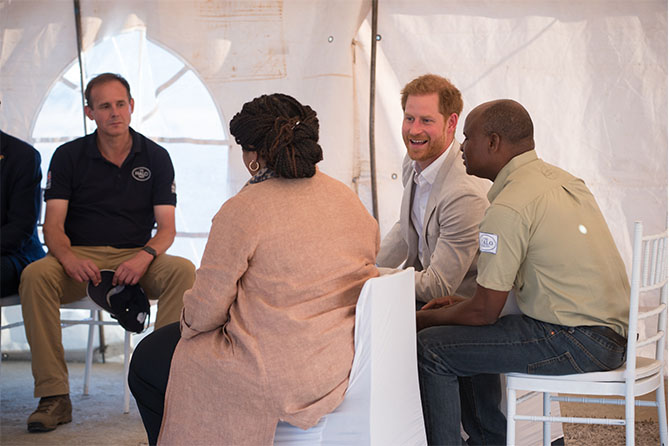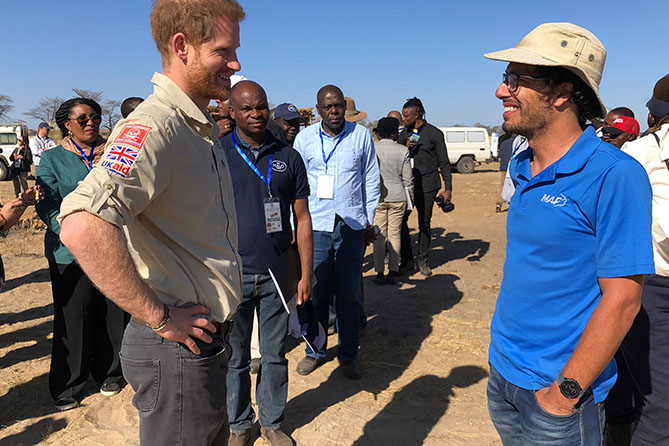A Royal Legacy – Demining Angola with MAF Partner HALO
Prince Harry visited Angola on September 27th in support of The HALO Trust, a demining organization that Mission Aviation Fellowship (MAF) has provided flights for since HALO began work in the country in 1994.
HALO undertakes the dangerous, and incredibly important work of locating and removing landmines that still lurk underground more than 17 years after the end of the civil war that ravaged Angola for almost three decades. Their staff work tirelessly to recover these landmines, and rehabilitate entire minefields, improving the safety of millions of Angolans.
Outfitted in body armour, The Duke of Sussex walked an active minefield and remotely detonated a landmine to remove it from the field in Dirico before visiting Huambo, the site that his mother, Princess Diana, visited in 1997.
Her visit brought international attention to this cause, and its impact on those that live in areas where the landmines still silently lie in wait. At the time Princess Diana visited Huambo, the area was being cleared of mines by HALO’s dedicated team. Sadly, she didn’t live to see the incredible impact her visit had. Today, there are homes, shops, and paved roads where mines once threatened – the land finally reclaimed after being made safe by HALO’s work.
In Dirico, MAF pilot Marijn Goud had the honour of meeting the Prince. As they spoke, Prince Harry remarked, “HALO could not do it without you, thanks!”
MAF is proud to partner with HALO in Angola, as they continue their life-saving work. Over the years, we have provided transport logistics for team members and VIPs conducting site visits, and arranged flights to remote communities for staff changes.
Our aircraft is also on call around-the-clock should the need arise for a casualty evacuation (casevac). This emergency service is something we hope we never need to provide. With HALO’s commitment to the proper training and safety of their teams, and their careful operations, despite the dangers, the requirement for emergency flights has been extremely rare over the past 25 years that we have worked together.
“As people providing technical support and practical help for rural Angolan communities, we are pleased to be able to support The HALO Trust in their efforts to remove landmines and other unexploded ordinance. Although the conflict has been over for many years, this material continues to cause horrific injuries and death to rural people generations later. We are excited to see cleared areas of land returned to community use for farming, schools, and housing, freed from the land-mine threat that existed for so many years,” shares Lowell Deering, VP of Operations and Recruiting, for MAF Canada.
MAF began operating in Angola in 1989 to provide essential support for NGOs, missions, and churches in a country still in the grip of civil war; 1.5 million lives were lost and 4 million people displaced in the 27 years of fighting from 1975 to 2002.
During that time, an estimated 10 million landmines were laid all over the country for maximum destruction during the war, encircling communities and endangering roads. These remnants of war continue to put Angolans at risk every day as they travel, work the ground for farming, and simply walk around their communities.
HALO reports to have removed over 100,000 landmines to date, but consider that their work is far from finished. They also work in cooperation with the Angolan police and military to destroy thousands of weapons and tons of ammunition, much of which is also left over from the war.
They also support local communities with education, teaching people how to stay safe from the out-of-sight mines, and employ nearly 400 Angolan men and women in their operations. A project that launched in 2017 named ‘100 Women in Demining’ aims to train and empower all-female demining teams.
In Angola there are fewer work opportunities for women, so this program is key in empowering them to earn an income, and be trained in new skills that are used in the organization’s operations from landmine clearance, to paramedics, to truck driving, and leadership.
Over the last two years, HALO reports that more than 78 women have been recruited from low-income communities to participate in this program, and 80% of them are single mothers. Six of these women have been promoted to leadership roles and 19 have completed paramedic training through the initiative. These women are not only creating a new future for themselves and their children, but also their country as a whole as they make communities safer one landmine at a time.
The Angolan government has recently announced funding of $60 million to clear 153 minefields in the country. One of these is a key site near the Okavango River Delta. Declared a World Heritage Site, and recognized as one of Africa’s richest areas of biodiversity that supplies water to more than 1 million people, the Okavango Delta is a key region in need of conservation. In order to reach it, however, wildlife must cross ground to the southeast that is riddled with landmines – making the journey potentially lethal to both the people and animals seeking to reach the life-sustaining headwaters.
Speaking on the importance of clearing this area of land from the deadly mines, The HALO Trust shares this quote from HRH, The Duke of Sussex:
“Clearing the minefields in southeast Angola will help protect human life. Moreover it is the first step in allowing local communities to protect wildlife with the kind of conservation-led development that has been so crucial elsewhere on the continent.”
Story by Beth Round with photos by Marijn Goud. First published by MAF Canada.








